Liye Fu
Comparing Sentence-Level Suggestions to Message-Level Suggestions in AI-Mediated Communication
Feb 26, 2023



Abstract:Traditionally, writing assistance systems have focused on short or even single-word suggestions. Recently, large language models like GPT-3 have made it possible to generate significantly longer natural-sounding suggestions, offering more advanced assistance opportunities. This study explores the trade-offs between sentence- vs. message-level suggestions for AI-mediated communication. We recruited 120 participants to act as staffers from legislators' offices who often need to respond to large volumes of constituent concerns. Participants were asked to reply to emails with different types of assistance. The results show that participants receiving message-level suggestions responded faster and were more satisfied with the experience, as they mainly edited the suggested drafts. In addition, the texts they wrote were evaluated as more helpful by others. In comparison, participants receiving sentence-level assistance retained a higher sense of agency, but took longer for the task as they needed to plan the flow of their responses and decide when to use suggestions. Our findings have implications for designing task-appropriate communication assistance systems.
Facilitating the Communication of Politeness through Fine-Grained Paraphrasing
Nov 30, 2020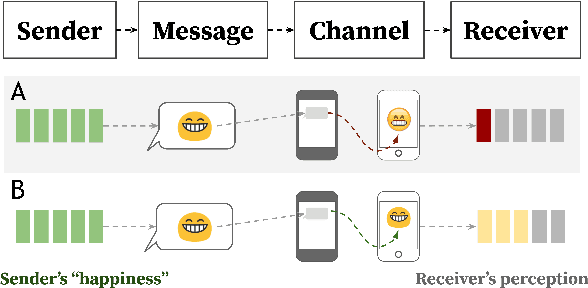
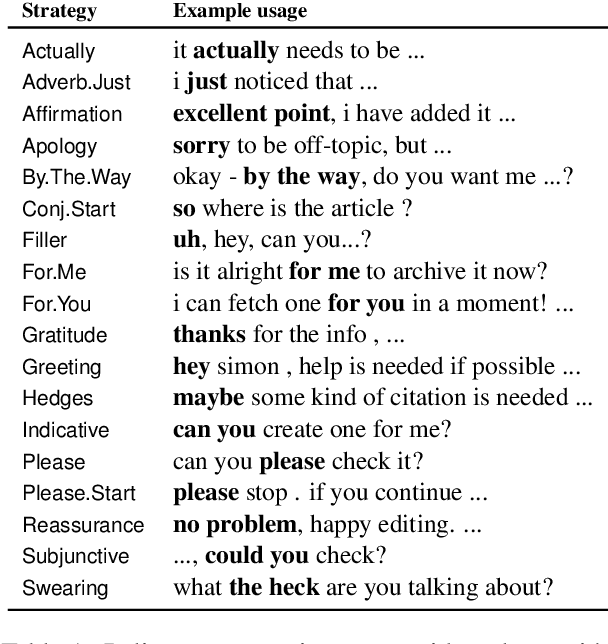
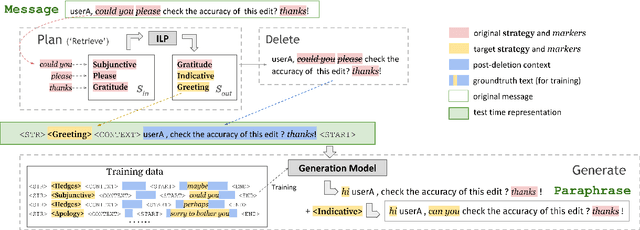

Abstract:Aided by technology, people are increasingly able to communicate across geographical, cultural, and language barriers. This ability also results in new challenges, as interlocutors need to adapt their communication approaches to increasingly diverse circumstances. In this work, we take the first steps towards automatically assisting people in adjusting their language to a specific communication circumstance. As a case study, we focus on facilitating the accurate transmission of pragmatic intentions and introduce a methodology for suggesting paraphrases that achieve the intended level of politeness under a given communication circumstance. We demonstrate the feasibility of this approach by evaluating our method in two realistic communication scenarios and show that it can reduce the potential for misalignment between the speaker's intentions and the listener's perceptions in both cases.
ConvoKit: A Toolkit for the Analysis of Conversations
May 08, 2020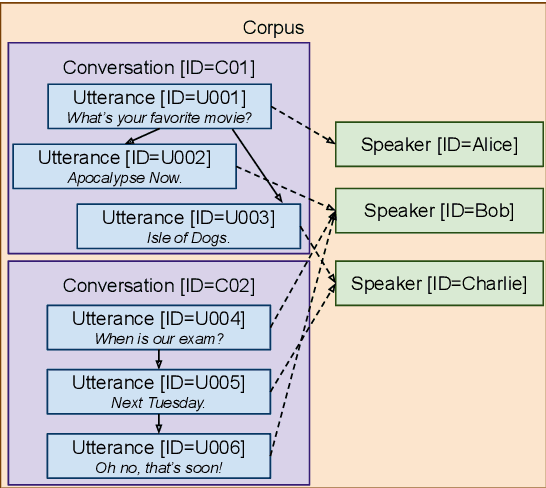
Abstract:This paper describes the design and functionality of ConvoKit, an open-source toolkit for analyzing conversations and the social interactions embedded within. ConvoKit provides an unified framework for representing and manipulating conversational data, as well as a large and diverse collection of conversational datasets. By providing an intuitive interface for exploring and interacting with conversational data, this toolkit lowers the technical barriers for the broad adoption of computational methods for conversational analysis.
Asking the Right Question: Inferring Advice-Seeking Intentions from Personal Narratives
Apr 02, 2019

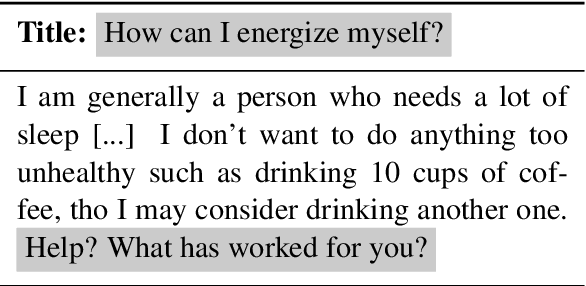

Abstract:People often share personal narratives in order to seek advice from others. To properly infer the narrator's intention, one needs to apply a certain degree of common sense and social intuition. To test the capabilities of NLP systems to recover such intuition, we introduce the new task of inferring what is the advice-seeking goal behind a personal narrative. We formulate this as a cloze test, where the goal is to identify which of two advice-seeking questions was removed from a given narrative. The main challenge in constructing this task is finding pairs of semantically plausible advice-seeking questions for given narratives. To address this challenge, we devise a method that exploits commonalities in experiences people share online to automatically extract pairs of questions that are appropriate candidates for the cloze task. This results in a dataset of over 20,000 personal narratives, each matched with a pair of related advice-seeking questions: one actually intended by the narrator, and the other one not. The dataset covers a very broad array of human experiences, from dating, to career options, to stolen iPads. We use human annotation to determine the degree to which the task relies on common sense and social intuition in addition to a semantic understanding of the narrative. By introducing several baselines for this new task we demonstrate its feasibility and identify avenues for better modeling the intention of the narrator.
When confidence and competence collide: Effects on online decision-making discussions
Mar 05, 2017


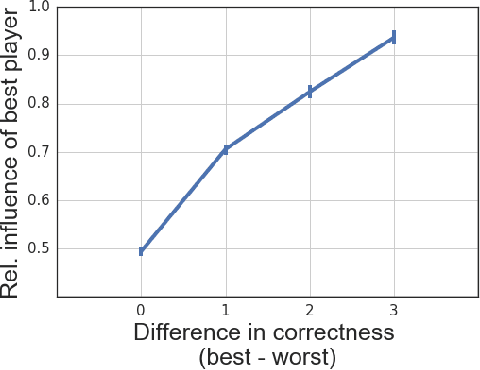
Abstract:Group discussions are a way for individuals to exchange ideas and arguments in order to reach better decisions than they could on their own. One of the premises of productive discussions is that better solutions will prevail, and that the idea selection process is mediated by the (relative) competence of the individuals involved. However, since people may not know their actual competence on a new task, their behavior is influenced by their self-estimated competence --- that is, their confidence --- which can be misaligned with their actual competence. Our goal in this work is to understand the effects of confidence-competence misalignment on the dynamics and outcomes of discussions. To this end, we design a large-scale natural setting, in the form of an online team-based geography game, that allows us to disentangle confidence from competence and thus separate their effects. We find that in task-oriented discussions, the more-confident individuals have a larger impact on the group's decisions even when these individuals are at the same level of competence as their teammates. Furthermore, this unjustified role of confidence in the decision-making process often leads teams to under-perform. We explore this phenomenon by investigating the effects of confidence on conversational dynamics.
Tie-breaker: Using language models to quantify gender bias in sports journalism
Jul 13, 2016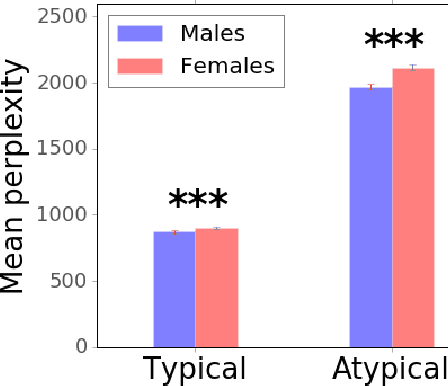

Abstract:Gender bias is an increasingly important issue in sports journalism. In this work, we propose a language-model-based approach to quantify differences in questions posed to female vs. male athletes, and apply it to tennis post-match interviews. We find that journalists ask male players questions that are generally more focused on the game when compared with the questions they ask their female counterparts. We also provide a fine-grained analysis of the extent to which the salience of this bias depends on various factors, such as question type, game outcome or player rank.
 Add to Chrome
Add to Chrome Add to Firefox
Add to Firefox Add to Edge
Add to Edge